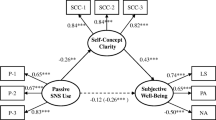Abstract
The current study investigates the validity of the Revised Self-Construal Scale in the Philippines through within and between network construct validation approaches. Six hundred sixty five (665) Filipino samples were selected and asked to answer the Revised Self-Construal Scale and Concise Measure of Subjective Well Being Scale. After executing confirmatory factor analyses (CFA) to validate the hypothesized three-factor structure of self-construal, findings revealed that the alternative two-factor model seems to be the most appropriate model that represents cultural self-views of the present sample. Independent self-construal and interdependent self-construal also had acceptable reliability coefficients. Correlational analyses showed that both independent self-construal and interdependent self-construal were positively correlated with life satisfaction and positive affect. Yet, multiple regression analyses revealed that interdependent self-construal operates as a stronger predictor of life satisfaction and positive affect. Theoretical and practical implications of these results are discussed.

Similar content being viewed by others
References
Arnocky, S., Stroink, M., & DeCicco, T. (2007). Self-construal predicts environmental concern, cooperation, and conservation. Journal of Environmental Psychology, 27, 255–264. doi:10.1016/j.jenvp.2007.06.005.
Bernardo, A. B. I. (2011). Lost in translation? Challenges in using psychological tests in the Philippines. Siliman Journal, 52(1), 19–42.
Cheng, R. W., & Lam, S. (2013). The interaction between social goals and self-construal on achievement motivation. Contemporary Educational Psychology, 38, 136–148. doi:10.1016/j.cedpsych.2013.01.001.
Erikson, E. H. (1982). The life cycle completed. New York: W.W. Norton.
Finney, S. J., & DiStefano, C. (2006). Non-normal and categorical data in structural equation modeling. In G. R. Hancock & R. O. Mueller (Eds.), Structural equation modeling: a second course (pp. 269–314). Greenwich: Information Age.
Grimm, S. D., Church, T. A., Katigbak, M. S., & Reyes, J. A. (1999). Self-described traits, values, and moods associated with individualism and collectivism: testing I-C theory in an individualistic (U.S.) and a collectivistic (Philippine) culture. Journal of Cross-Cultural Psychology, 30, 466–500. doi:10.1177/0022022199030004005.
Hashimoto, H., & Yamagishi, T. (2013). Two faces of interdependence: harmony seeking and rejection avoidance. Asian Journal of Social Psychology, 16, 142–151. doi:10.1111/ajsp.12022.
Hu, L. T., & Bentler, P. M. (1999). Cutoff criteria for fit indexes in covariance structure analysis: conventional criteria versus new alternatives. Structural Equation Modeling, 6, 1–55.
Ju, H., Shin, J. W., Kim, C., Hyun, M., & Park, J. (2013). Mediational effect of meaning in life on the relationship between optimism and well-being in community elderly. Archives of Gerontology and Geriatrics, 56(2), 309–313. doi:10.1016/j.archger.2012.08.008.
King, R. B., & Watkins, D. A. (2012). Cross-cultural validation of the five-factor structure of social goals. Journal of Psychoeducational Assessment, 30(2), 181–193. doi:10.1177/0734282911412542.
King, R. B., Ganotice, F. A., & Watkins, D. A. (2012). Validation of the Chinese version of the sense of self (SOS) Scale. Asia Pacific Education Review, 13, 323–331.
Kitayama, S., Markus, H. R., Matsumoto, H., & Norasakkunkit, V. (1997). Individual and collective processes in the construction of the self: Self-enhancement in the United States and self-criticism in Japan. Journal of Personality and Social Psychology, 72, 1245–1267.
Kwan, V. S. Y., Bond, M. H., & Singelis, T. M. (1997). Pancultural explanations for life satisfaction: adding relationship harmony to self-esteem. Journal of Personality and Social Psychology, 73, 1038–1051. doi:10.1037/0022-3514.73.5.1038.
Lam, B. T. (2005). Self-construal and depression among Vietnamese-American adolescents. International Journal of Intercultural Relations, 29, 239–250. doi:10.1016/j.ijintrel.2005.05.007.
Levine, T. R., Bresnahan, M. J., Park, H. S., Lapinski, M. K., Wittenbaum, G. M., Shearman, S. M., et al. (2003). Self-construal scales lack validity. Human Communication Research, 29, 210–252. doi:10.1111/j.1468-2958.2003.tb00837.x.
Little, T. D., Cunningham, W. A., Shahar, G., & Widaman, K. F. (2002). To parcel or not to parcel: exploring the question weighing the merits. Structural Equation Modeling, 9, 151–173.
Lu, L., & Gilmour, R. (2004). Culture and conceptions of happiness: individual oriented and social oriented SWB. Journal of Happiness Studies, 5, 269–291. doi:10.1007/s10902-004-8789-5.
Lu, L., & Gilmour, R. (2007). Developing a new measure of independent and interdependent views of the self. Journal of Research in Personality, 41, 249–257. doi:10.1016/j.jrp.2006.09.005.
Lu, L., Gilmour, R., Kao, S. F., Eng, T. H., Hu, C. H., Chern, J. G., et al. (2001). Two ways to achieve happiness: when the east meets the west. Personality and Individual Differences, 30, 1161–1174. doi:10.1016/S0191-8869(00)00100-8.
Luo, W., Hogan, D., & Paris, S. G. (2011). Predicting Singapore students’ achievement goals in their english study: self-construal and classroom goal structure. Learning and Individual Differences, 21, 526–535. doi:10.1016/j.lindif.2011.07.002.
Markus, H. R., & Kitayama, S. (1991). Culture and the self: implications for cognition, emotion, and motivation. Psychological Review, 98, 224–253.
Oishi, S., & Diener, E. (2001). Goals, culture, and subjective well-being. Personality and Social Psychology Bulletin, 27, 1674–1682. doi:10.1177/01461672012712010.
Reyes, J. A. S. (2005). Conceptualizing the happy filipino: implicit theories of counselors and students. Philippine Journal of Counseling Psychology, 7(1), 99–113.
Singelis, T. M. (1994). The measurement of independent and interdependent self-construals. Personality and Social Psychology Bulletin, 20, 580–591. doi:10.1177/0146167294205014.
Su, J. C., Lee, R. M., & Oishi, S. (2012). The role of culture and self-construal in the link between expressive suppression and depressive symptoms. Journal of Cross-Cultural Psychology, 44(2), 316–331. doi:10.1177/0022022112443413.
Suh, E. M., & Koo, J. (2011). A concise measure of subjective well-being (COMOSWB): scale development and validation. Korean Journal of Social and Personality Psychology, 25, 96–114.
Takata, T. (2000). On the scale for measuring independent-interdependent view of self. Bulletin of Research Institute Nara University, 8, 145–163 (in Japanese).
Triandis, H. C. (1989). The self and social behavior in different cultural contexts. Psychological Review, 96, 269–89.
Uchida, Y., & Ogihara, Y. (2012). Personal or interpersonal construal of happiness: a cultural psychological perspective. International Journal of Wellbeing, 2(4), 354–369. doi:10.5502/ijw.v2.i4.5.
Yamaguchi, A., Kim, M., & Akutsu, S. (2014). The effects of self-construals, self-criticism, and self-compassion on depressive symptoms. Personality and Individual Differences, 68, 65–70. doi:10.1016/j.paid.2014.03.013.
Author information
Authors and Affiliations
Corresponding author
Electronic supplementary material
Below is the link to the electronic supplementary material.
ESM 1
(DOCX 15 kb)
Appendix
Appendix
Rights and permissions
About this article
Cite this article
Datu, J.A.D. Validating the Revised Self-Construal Scale in the Philippines. Curr Psychol 34, 626–633 (2015). https://doi.org/10.1007/s12144-014-9275-9
Published:
Issue Date:
DOI: https://doi.org/10.1007/s12144-014-9275-9




